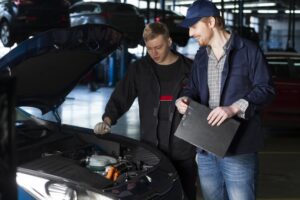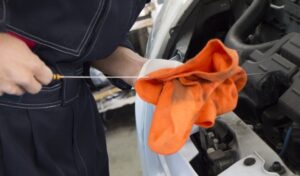The Current Situation of Japan’s Automotive Maintenance Industry
Hello! I’m K-ZAK, a certified automotive mechanic working in Japan. I created this website because I want to support people from around the world who dream of becoming mechanics in Japan.
Today, I want to talk about the real situation of Japan’s automotive maintenance industry—its challenges, the demand for skilled workers, and why now is a unique time for foreign workers to consider a career here.
Japan’s Automotive Industry: A Global Giant
Japan is one of the biggest automotive nations in the world. Companies like Toyota, Honda, Nissan, and Subaru are known for high-quality vehicles and cutting-edge technology. Thanks to this strong industry, there is a large network of car dealerships, workshops, and service centers across the country.
Japanese people take excellent care of their cars. Regular inspections (called shaken), routine maintenance, and seasonal checks are part of the culture. As a result, the demand for skilled mechanics has always been high.
The Challenges Facing Japan’s Automotive Maintenance Industry
Despite its strength, the automotive maintenance industry in Japan faces serious challenges. Here are some of the biggest issues:
1. Labor Shortage
Japan’s population is shrinking and aging rapidly. Many experienced mechanics are retiring, and there aren’t enough young people to replace them. Workshops and car dealers are struggling to find skilled staff, especially in rural areas.
According to industry reports, there is a growing gap between the number of vehicles needing service and the number of available mechanics. This shortage can affect customer service, waiting times, and even business sustainability for smaller workshops.
2. High Level of Technology
Japanese cars are becoming more advanced every year. Mechanics now need to understand electronic systems, computers, hybrid engines, and complex diagnostic tools. This requires continuous learning and high-level skills.
While this technology makes cars safer and more efficient, it also creates a challenge for mechanics who must keep up with constant changes.
3. Physical Demands
Automotive work is physically demanding. Mechanics often work in awkward positions, handle heavy parts, and spend long hours on their feet. Younger generations in Japan are less interested in physically demanding jobs, which adds to the labor shortage.
Why Japan Needs Foreign Mechanics
Because of these challenges, Japan has started looking overseas for talented mechanics. The government has introduced new visa systems like the Specified Skilled Worker (SSW) visa to allow foreigners to work in industries facing labor shortages.
In the automotive field, foreign workers can play a crucial role by:
- Filling labor gaps in workshops and dealerships
- Bringing fresh perspectives and techniques from other countries
- Helping sustain the automotive service network, especially in local areas
This is a significant opportunity for people who have skills and motivation. Japan is looking for individuals willing to learn, work hard, and contribute to the industry’s future.
The Specified Skilled Worker Visa
One of the most important changes in recent years is the introduction of the Specified Skilled Worker (SSW) visa. This visa allows foreign workers to stay in Japan and work in industries like automotive maintenance.
To qualify for the SSW visa as a mechanic, you generally need to:
- Pass the automotive skill test (自動車整備分野特定技能評価試験)
- Pass a Japanese language test, usually JLPT N4 level or JFT-Basic
- Be physically healthy and prepared for demanding work
Many countries now have agreements with Japan to send workers under this visa. It’s a new door opening for skilled people who want to live and work in Japan.
The Future Outlook
The future of Japan’s automotive maintenance industry depends heavily on new talent. Workshops and dealers are actively seeking people who:
- Can learn modern technology
- Have strong work ethics and reliability
- Are willing to integrate into Japanese culture and workplace standards
There’s also growing interest in electric vehicles (EVs) and sustainable technology. Mechanics with skills in EV systems, battery maintenance, and electronic diagnostics will become even more valuable in the coming years.
For foreign workers, this means not only job security but also the chance to learn advanced techniques that can become valuable skills anywhere in the world.
My Message to You
As someone who has worked both in Japan and overseas, I understand how exciting and challenging it can be to start a new life in another country. I created this website because I want to share the real situation of the Japanese automotive industry and help you prepare for a successful future here.
If you’re considering becoming a mechanic in Japan, know this:
- Japan needs your skills.
- There are real opportunities for growth and stability.
- It won’t be easy, but it will be rewarding.
I believe skilled people deserve the chance to build a better life. My mission is to provide information, encouragement, and practical support for anyone who wants to work as a mechanic in Japan.
If you have questions about working in Japan, the visa process, or the automotive industry, please feel free to contact me. Together, we can take the first step toward your new future!


